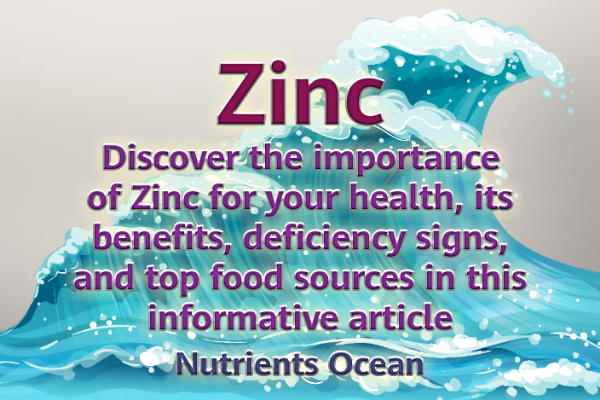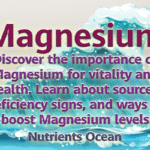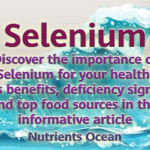
Zinc
When it comes to keeping our bodies in top shape, we often focus on the big players like protein, carbohydrates, and fats. But there’s a tiny yet mighty mineral that deserves our attention: zinc. This unsung hero plays a crucial role in our overall health and well-being.
Importance and Health Benefits of Zinc
First off, let’s talk about why zinc is so important. This mineral is involved in countless bodily processes, from supporting our immune system to aiding in wound healing. It’s also essential for proper growth and development, making it particularly vital for children and adolescents.
One of the standout benefits of zinc is its role in immune function. It acts as a powerful antioxidant, helping to fight off harmful free radicals and protect our cells from damage. This means that getting enough zinc in your diet can help reduce the risk of infections and support a strong immune response.
But that’s not all—zinc also plays a key role in metabolism, helping our bodies convert food into energy. It’s involved in the synthesis of DNA and protein, making it essential for cell growth and repair. Plus, zinc is necessary for maintaining healthy skin, hair, and nails, so it’s no wonder it’s often found in beauty products.
Food Sources of Zinc
Here are some food and natural sources of zinc along with brief explanations:
1. Shellfish:
Shellfish like oysters, crab, and shrimp are among the best sources of zinc. Just a few servings per week can provide a significant amount of this essential mineral.
2. Meat:
Beef and lamb are rich in zinc, especially in their lean cuts. Incorporating these meats into your diet can help boost your zinc intake.
3. Poultry:
Chicken and turkey are also good sources of zinc. Opt for skinless cuts to keep your intake of saturated fat in check.
4. Legumes:
Beans, lentils, and chickpeas are not only rich in protein and fiber but also contain decent amounts of zinc. They’re a great option for vegetarians and vegans looking to increase their zinc intake.
5. Nuts and Seeds:
Certain nuts and seeds, such as pumpkin seeds, cashews, and almonds, are packed with zinc. Snacking on these nutritious treats can help boost your zinc levels.
6. Whole Grains:
Whole grains like wheat, rice, and quinoa contain zinc, although the levels may be lower compared to other sources. Still, incorporating whole grains into your diet can contribute to your overall zinc intake.
7. Dairy Products:
Dairy foods like milk, cheese, and yogurt contain zinc, along with other essential nutrients like calcium and vitamin D. However, keep in mind that some dairy products may be higher in saturated fat, so choose low-fat options when possible.
8. Eggs:
Eggs are not only a versatile and affordable source of protein but also contain zinc. Including eggs in your diet can help ensure you’re getting a variety of essential nutrients, including zinc.
These are just a few examples of food and natural sources of zinc. By incorporating a variety of zinc-rich foods into your diet, you can ensure you’re meeting your daily requirements for this essential mineral.
Signs and Symptoms of Zinc Deficiency
So, what happens if you don’t get enough zinc? Well, a deficiency can lead to a host of health problems. Some common signs and symptoms include:
1. Weakened Immune System:
If you find yourself getting sick often or taking longer to recover from illnesses, it could be a sign of zinc deficiency.
2. Slow Wound Healing:
Zinc is essential for proper wound healing, so if you notice cuts or scrapes taking longer than usual to heal, it may be due to low zinc levels.
3. Loss of Appetite:
Zinc plays a role in regulating appetite, so a deficiency can lead to a decreased desire to eat.
4. Hair Loss:
Zinc deficiency has been linked to hair loss and thinning, so if you’re experiencing unexplained hair issues, it might be worth checking your zinc levels.
5. Poor Growth and Development:
In children and adolescents, a lack of zinc can lead to stunted growth and delayed sexual maturation.
Assessing Zinc Deficiency
Now, you might be wondering how to determine if you’re deficient in zinc. While blood tests can provide a definitive answer, there are also some signs to look out for:
- Unexplained Weight Loss
- Loss of Taste or Smell
- Difficulty Concentrating
- Skin Problems, such as acne or eczema
If you suspect you may be deficient in zinc, it’s essential to speak with a healthcare professional. They can help determine the best course of action, whether it’s through dietary changes or supplementation.
In conclusion, zinc may be small in size, but its impact on our health is enormous. From supporting our immune system to aiding in wound healing, this mineral plays a vital role in keeping us healthy and thriving. By ensuring we get enough zinc in our diets, we can unlock its many benefits and pave the way for optimal health and wellness.



